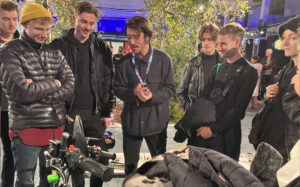Project
(BA ab 3.Sem, MA Anpassungsstudierende)
Montag & Dienstag
Raum 402+403
Deutsch / English
Kick-Off
15 Okt. 2024 10.00 Raum 402/403
Lehrende
Prof. Aeneas Stankowski
Lukas Henneberger
Complementary Workshops and Seminars:
Hands-on coding and intelligent platforms for designers
Daniel Varab (German Research Center for Artificial Intelligence)
Imagining futures – designing narratives
Johanna Wallenborn (HfG Offenbach)
Seeing algorithms
Lukas Henneberger
Dates
15. Oct 10:00
Kick-off and meet.
19-22. Oct
Excursion to DDW
16. Dec 10:00
Half-Time
11. Feb 10:00
Finals
Things for thought
How do things and the way we use them change the way we think and feel? Designing automation often prioritizes simplicity, speed, and efficiency.
Yet as technology increasingly automates tasks central to human expression, the very nature of these goals comes into question. What experiences, abilities, and social dynamics are lost when we automate? How does the convenience of automation reshape our skills, our interactions, and our sense of accomplishment? In a world where machines can do almost anything, choosing to do something yourself becomes a deliberate act. This course explores the critical balance between efficiency and meaningful engagement, examining how automation shapes our thought processes and perceptions, economic landscape and social interactions. We investigate the reciprocal relationship between humans and their creations: how the tools we design in turn design us, mediating our understanding of the world and ourselves.
Studio Objectives:
- Create and prototype designs that critically engage with automation’s impact on human cognition and social interaction.
- Reimagine processes, interactions and systems, exploring how designing shapes skills, cognition, and social relationships.
- Develop a design philosophy that considers the reciprocal influence between humans and their tools, evaluating long-term cognitive and social implications.


